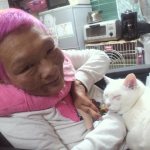Death with Dignity and Persons with Disabilities
2015-06-15 Life with Dignity
Shoji Nakanishi (Board Member, DPI-Japan)
Current Circumstances
There have been some actions taken to legalize “death with dignity”, which is based on the individual’s own decision to refuse life prolonging treatment. A non-partisan parliamentary alliance would submit a Bill to Respect Individual Will Concerning Medical Care in the Terminal Phase (the Bill on Death with Dignity) to the Diet. In accordance with this bill, if a patient has refused life-prolonging treatments, the assigned doctor cannot be held responsible for that patient’s death. If passed and enacted, the bill would also widely affect rescue and life-saving activities.
There appears to be strong support for this bill. The organization lobbying for this cause is the Japan Death with Dignity Association. Mr Soichiro Iwao, the chairperson of the association, was the former secretary general of the Health Policy Bureau of the Ministry of Health, Labor and Welfare. The top advisor to the Parliamentary Union to Discuss Legislation Concerning Death with Dignity is Mr Taro Aso, the deputy prime minister of Japan.
In this article, I would like to discuss the problems of the bill from the viewpoint of persons with disabilities.
The Bill on Optional Euthanasia
The Japan Society for Dying with Dignity was formerly known as the Japan Euthanasia Association, and was founded by Dr. Tenrei Ota. He proposed a Bill on Optional Euthanasia in his book ‘Recommendations Concerning Euthanasia, published in 1973.
Though he tried to introduce the bill to the Diet, he did not succeed. The name of the association was then changed to the Japan Society for Dying with Dignity and under its chairperson, Mr. Iwao, the society has continued efforts to submit the bill to the Diet. If enacted, this could also lead them to pursue the establishment of a Law on Euthanasia, and thus requires us to follow developments closely.
In regard to the Right to Die
I have promoted the independent living movement of people with disabilities for 28 years, and in recent times have seen those using ventilators for their ALS and those with muscular dystrophy finally being able to live comfortably with 24 hour personal assistants in local communities. I derive happiness from knowing they are leading fulfilling lives.
There may be many people who fear becoming disabled themselves, or who are afraid to experience severe forms of disability. However, most people actually living with such disabilities enjoy their lives, and haven’t thought of anything close to taking their own lives.
However, in order to foster such a situation, it is necessary to have adequate public assistance by dispatching appropriate personal assistants, no burden on families and siblings, and the freedom of choice. Insufficient public support, including lack of personal assistants, places a heavy burden on their families,people with disabilities feel guilty and think their family will be happier without themselves.
The independent living movement provides peer counseling and an independent living program to those with disabilities, and teach the ideas of a concept of the social model in which the problems of disabilities are derived from the insufficiency of the societal environment, and not from the individuals themselves. This has encouraged more people with disabilities to pursue a lifestyle in their communities.
From this perspective, people who promote (the Bill on Death with Dignity) think that receiving assistance is denying one’s existence as a human being, and that there is great value in refusing assistance from others and ending one’s own life in the way one wishes. It is along this vein of thought that supporters hope to convince others of this same value, and thus have it changed into legislation.
Issues with creating a law on death with dignity
- Is a living will effective?
The basis for the legislation for death with dignity is the decision made by the individual, and based entirely on their own will. In the case that a person documents their volition in a living will, and should they lose consciousness in accidents or other disasters, doctors are legally allowed not to perform life-prolonging treatment.
However, the will of human beings changes over time. Although when in good health they decide not to take any life-prolonging treatment at the terminal phase of their lives, people tend to want to survive in the face of death. In such cases, even if they know that their families and doctors are about to pull out their respirators based on their previous living wills, they cannot say a word, but only regret having written the document. These kinds of accidents cannot be prevented once the said law is enacted.
- What will the exemption clause for doctors bring about?
Patients would like to readily rely on their doctors and entrust them with their lives. Article 1 of Chapter I of the Medical Practitioners’ Act says that medical practitioners shall contribute to the improvement and promotion of public health, and ensure citizens lead healthy lives, by administering medical care health guidance. Assisting patients in committing suicide or halting life-prolonging treatment is not considered as part of a doctor’s duties. Under the current Act on Brain Death and Organ Transplantation, would a doctor be tempted to decide prematurely to halt treatment in order to get a fresh organ from a patient determined brain-dead? Can doctors continuously be the ones to whom patients may entrust their lives? I am deeply concerned that the exemption clause for doctors in Chapter 9 of Bill #2 on Death with Dignity could cause the relationship of mutual trust between patients and doctors to waver – a very grave problem indeed.
Let me give one example. At the meeting of LDP’s Project Team (PT) for Reviewing Death with Dignity, held on February 27, 2014, Mr. Makoto Ohama, Vice-Chairman of Spinal Injuries Japan attended in his wheelchair and spoke of his experiences from his rugby injuries. These injuries caused him to be taken to hospital by ambulance, where he fell into a serious condition on three occasions. He expressed his opposition to the legislation saying that, “I may not be here today if I had written a living will before my injury,” and continued, “The legislation might lead to denial of life for people with severe disabilities.”
- Intention of the family and the individual with disabilities
There are many people with disabilities who have had similar experiences to Mr. Ohama Even though their life could be prolonged if the person was intubated, the burden on their family would be extraordinary since tracheotomy would need to be performed and a respirator also indispensable hereafter. With such an explanation, the family is required by the doctor to make a prompt decision in the emergency room. If a living will exists, the doctor and the family abort the treatment without hesitating. Mr. Ohama would not exist.
These doctors and families often do not know that a person with tracheal intubation could live by dispatching personal assistants as a public service. If this option was given to them, they could certainly make a decision to prolong the life of their family member without hesitation. The proposed Bill on Death with Dignity lacks assurance that such information will be provided. And although the excuse can be made that a living will can be retracted at any time, in reality, we cannot discount the possibility of a situation where there is no going back.
A person with a severe disability would know that the intention of their family and that of themselves are often at odds. The family is filled with anxiety if the burden of care-giving is somehow suggested, and should a living will exist, feel inclined to agree to the halting of life prolonging treatment. I would like both the family and the doctor to make every effort to help the patient live to the bitter end. I myself sustained a cervical cord injury in an accident when I was 21 years old, and was told by my doctor that I would only have 6 months to live. However, I have lived my life for over 40 years and have even been able to contribute to society. Besides this, healthcare is continually improving. The lives that hold no certainty today will come to naturally live longer in a few years.
I am deeply concerned that the view of society toward persons with severe disabilities may change after the Bill on Death with Dignity is passed. Why do those who have disabilities live so unashamedly? Why do they still live even though they have the choice of death with dignity? I am very worried that people with disabilities might be continually exposed to such questions.
- The Provision for End-of-Life
A Bill on Death with Dignity, or Songenshi (excerpt from the second proposal)
Definition
Article 5.1: In this act, the term “end-of-life” is defined as the period in which a patient is determined as having the least chance of recovery, and is close to death even after having received all possible and appropriate medical treatments*—including nutritional support and other life sustaining measures—for his or her disease. (* The same applies hereinafter.)
Article 5.2: In this act, the term “life-prolonging treatment” is defined as a medical measure aimed simply at extending the period of the patient’s life, and neither aims to cure the ailment, nor to ease pain in the end-of-life period.
Article 5.3: In this act, the term “termination of life-prolonging treatment” means 1) to withdraw any current life-prolonging treatment from a patient in the end-of -life period, or 2) the doctor will not take any new life prolonging measures aside from the one currently being received by the patient, even in the case that such new measures are necessary.
Decision to End One’s Life
Article 6: Making a decision for Article 5.1 (hereinafter referred to as the “Decision to End One’s Life.”) shall depend upon the assessment of two or more practitioners with the necessary knowledge and experience for such a decision, and the assessment based on generally accepted medical knowledge.
Many people are concerned about the ambiguity of the provision for the End-of-Life in Article 6 of the Bill on Death with Dignity, or Songenshi. Anyone can recognize an “emergency, situation” whereas no one can decide the period for the end of life. It’s said that even if doctors are asked, no one can determine for sure if someone is in the terminal phase. In fact, there have been cases where some patients have lived ten years or longer after being informed by their physicians that they only had 3 months to live due to terminal cancer. It just demonstrates that cancer may disappear before anyone realizes. No one can claim to know the secret of life. If a patient suffers acute pain from entering the terminal phase, then it’s possible to alleviate such pain. This shows that there is no need for the termination of life-prolonging treatment. Then, why would the law like to stipulate the term “end-of-life?” The only possibility is that death with dignity is the goal, and that in order to rationalize it, the end-of-life period must be acknowledged and specified.
5 Non-Initiation and Discontinuance of Life-Sustaining Treatment
It may well be that more than two medical specialists determine that the patient has passed beyond being able to be cured with any further medical treatment from modern medicine. (Article 6)
But almost everyone would certainly disagree with the state intervening and deciding which candidates should not receive treatment based on the Death with Dignity Act. Most would say that the decision to receive anticancer treatment in anticipation of pain in the terminal phase, or to continue ongoing treatment is the individual’s choice.
For patients suffering from progressive muscular dystrophy and in need of tracheotomy, they would inevitably be led to think that they should no longer live if their doctor attempted to get informed consent from them for the Death with Dignity Act. If this act makes non-initiation legal, such a situation could arise.
Moreover, for those using respirators, living with such devices is a part of their life. And hearing of their friends from hospital dying after having their respirators detached will become a regular truth that will make them feel afraid.
The people proposing the Bill for Death with Dignity would say that they will not intervene in a delicate issue such as that. However if the bill were enacted and implemented, the issue would no longer be in their hands, and could lead to the view that it’s shameful to be living with a respirator after having a tracheotomy.
My Finnish friend got well after having a tracheotomy, began using an artificial respiration device, got elected to the Diet, and makes campaign speeches in minus 20 ℃ weather.
He even became the Chairperson of DPI ”Disabled Peoples’ International”, travels all over the world, and has visited Japan three times. Such perception that life is over by needing an artificial respiration device does not apply to him at all. In Shizuoka Japan as well, a city councilor who used an artificial respiration device after a tracheotomy was active until two years ago.
Discontinuance of life-sustaining treatment is purely an individual choice, and the state should not be intervening at all by creating a law such as Bill on the Death with Dignity.
6 Public Finance and Human Life
There is no doubt that human life is more precious than the earth.
However, owing to advancing medical care and an unprecedented increase in life expectancy, it has become the norm for people to live to the age of 100. As a result, Japanese society is aging and it is not unusual for a daughter aged 80 to take care of her 100 year old parents. There is a tendency for the Japanese government to fear financial collapse from the huge medical expenses for the aged. Since 2005, the government have shifted from conventional policies, which saw people in hospital at the moment of their death, to new ones which encourage them to be at home with their family instead – positioning an improvement in home health care as a measure to support this. Nevertheless, medical expenses are continuously burgeoning. Some people think that a bill for a law on death with dignity which allows the discontinuation of treatment, as well as escape clauses which enable doctors to stop treatment, has been prepared under such difficult circumstances.
It is deplorable that public measures ignore human life in order to reduce medical expenses. However, nobody would be surprised if these measures really were regarded as national policies, what with the former Director General of the Health Policy Bureau in the Ministry of Health, Labor and Welfare recklessly leading the charge as the current President of the Japan Death with Dignity Association.
Essentially, issues on death with dignity should be solved not by medical policies but by the policies of home welfare services like the personal assistance service. It is unreasonable for public policies to permit doctors to discontinue medical treat and hasten someone’s death. There is no legislation to allow death with dignity, but according to the data from the Japan Death with Dignity Association, 92% of its registered members have already taken such an option. Though the aforementioned escape clauses for doctors are also not specified by law, doctors who assisted in the death of that 92% may be removing feeding tubes and disconnecting respirators from patients based not on the patient’s consent but their families and facing no prosecution.
In actuality, despite no laws on death with dignity, life-support treatment is being discontinued across the country in accordance with patients’ decisions as we speak. Even under such circumstances however, some people insist on the enactment of the laws and their intentions are questionable. If a bill on a law on death with dignity is enacted, will many patients who cannot express their wishes be pleased about the issues that would arise from enacting the bill? The bill would mean that a doctor, with the consent of the patient’s family and another doctor, can act without hesitation knowing that he will not be prosecuted for assisted suicide. He could transplant organs to other patients whom he deems in need of medical treatment, and could use the legal technicality from Paragraph 2, Article 13 which states, “to halt the use of life-sustaining equipment or to take similar actions are not forbidden within the provisions of this law” to defend himself. Nobody can predict what will happen after the legislation comes into effect. Will people have less respect for human life than before and cause others to die without feeling any guilt? The draft of a law on Death with Dignity will not make people reaffirm the importance of human life, but would certainly create a social situation in which they disregard human life. The government should not be involved in the matter of life and death.
Overseas trend
The case which worries me the most is one that has already happened in many other countries, and which is also likely to happen in Japan. I’ll cite a case of The Ashely Treatment in the U.S. and a report of the right of self-decision on death around the world by Mami Kodama. Additionally I’ll introduce a report written by Jeanette A. Taudin Chabot, which warns that since Japan’s current system of informed consent is not thorough enough, institutionalizing the act of euthanasia in Japan may cause problems. However, she praises euthanasia movement in Holland.
”Calls for the right to make a decision about one’s own death have been spreading at an alarming rate. In 2007, when the Ashely Treatment was disputed, only Holland, Belgium and the state of Oregon in the U.S. legalized positive and willful euthanasia policies, and allowed and assisted suicide by doctors. Switzerland, a mecca for ‘suicide tourism’ is also regarded as having a law which can be interpreted to permit euthanasia. At first, this interpretation focused on people who needed alleviation from pain in their terminal phase, but has expanded to include persons with disabilities, the elderly, and people with disabilities or diseases who don’t wish to be a burden on their families. Not only has there been debate about the issue, but the general opinions in those counties are open-minded to assisted suicide. The background for these opinions may likely lie in the thought that there is ‘No worth in lives with disabilities’.”
“The Ashely Case”, Mami Kodama, 2011, Seikatsu-shoin, p227-228
Over the course of twenty years in Holland, euthanasia has been discussed from legal and social perspectives, as well as from the experiences of the citizens. Historically, they have developed a nationwide family doctor system. With the background, they continue to maintain the law which forbids euthanasia and assisted suicide, but have reformed the Act concerning burial in order to such acts by doctors in accordance with a strict procedure. This is unprecedented in the world. The legal requirement is the voluntary willingness of patients in the end of their lives. In my country, our culture tends to place more emphasis on patients’ family wills rather than the patients’ individual ones at the time of decision-making of their lives. Because of this, it is far too soon to be enacting euthanasia in Japan.
“Right to Choose Death for Myself”, Janet Akane Jabot, 1995, p234
Conclusion
The Act of Death with Dignity may lead straight to the act of euthanasia. This will propagate a tendency to view a life of disability as having no worth. The Research Institution for Leadership of Right of Persons with Disabilities for Bioethics conference will be held in Virginia from the 25th to 26th of April, 2014. The co-organizer, Not Dead Yet, is an advocate organization for rights of persons with disabilities and made up of the Federation of European Anti-euthanasia Law and DREDF, which is an organization founded by a lawyer related to the disability movement. We sent a statement opposing the enactment of the Act of Death with Dignity to the conference.
This is partly translated and edited by the volunteers; Akiko Iwamoto, Ayaka Mori, Fumihiro Murayama,Miho Okaue, Naoko Suzuki,Yumiko Kakuda and others.
More from my site
現在位置:ホーム > 新着情報 > Death with Dignity and Persons with Disabilities






